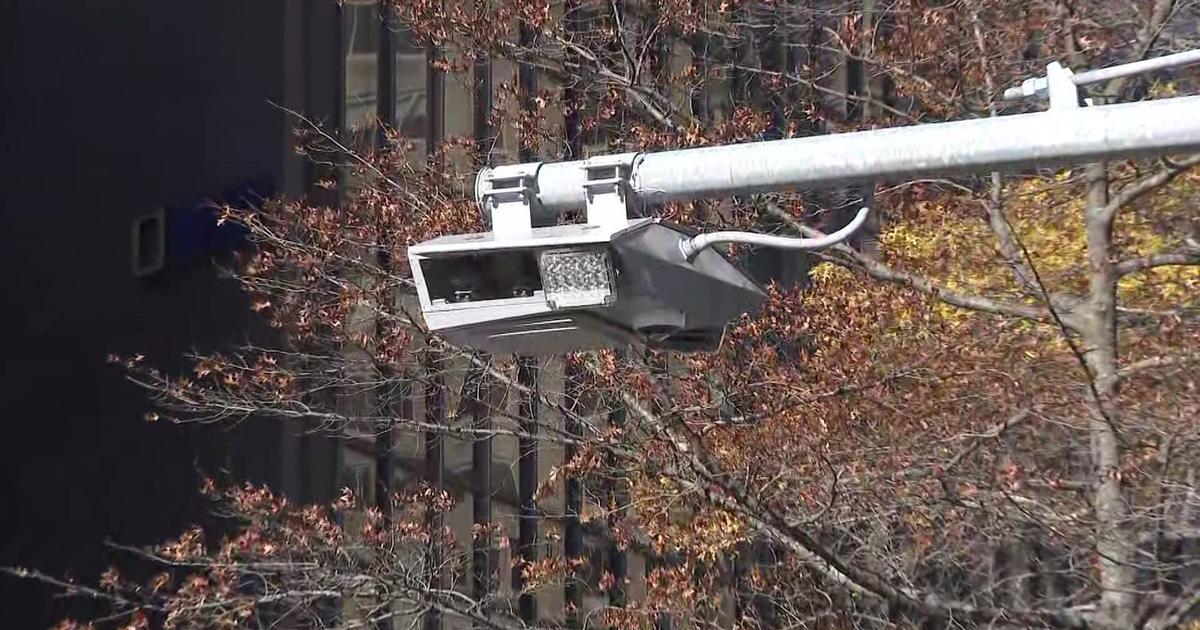'CBS Evening News' Chief Medical Correspondent Dr. Jonathan LaPook Answers Questions On Ebola
NEW YORK (CBSNewYork) -- "CBS Evening News" Chief Medical Correspondent Dr. Jonathan LaPook spent a full hour in the WCBS 880 studios Thursday morning answering questions about Ebola.
Here's what he had to say.
QUESTION: Do you think the screening procedures at airports will make a difference?
DR. LAPOOK: "I think if you look at the numbers, they may help people psychologically. I'm not sure how much in reality they're going to help. So look at the numbers. Dr. Frieden, the head of the CDC, told us yesterday 150 travelers every day come from West Africa from these three countries to the United States. They have already in the last two months screened ... 77 people (with fever), who have been pulled off the plane, so not allowed to get on. None of them have tested positive for Ebola. So now you look on the other end, those people with fever have already been pulled out, so now you're going to the airports in the United States. You would think that statistically it would be an even lower chance of having fever."
Full Interview With Dr. Jonathan LaPook
QUESTION: And any parent knows you can knock down a fever by giving a kid Tylenol?
DR. LAPOOK: "And even without implying somebody trying to hide their fever, we have to remember that the incubation period for this is two to 21 days. So somebody can feel perfectly fine, not be lying at all about how they're feeling or whether they think they have Ebola, get on a plane, be incubating the virus, come to the United States and then get Ebola here."
QUESTION: Do you have any concerns with the screening process itself as far as the agents who are going to be doing it? Do they need some extra training, or do you think it's pretty basic?
DR. LAPOOK: "We're finding out from Dallas, where there was a fumbling of the protocol there -- and this is from physicians and nurses who are expecting a potential Ebola patient. Mr. Duncan came in and he said he was from West Africa, had symptoms that were consistent with Ebola and was initially sent home. So these are professionals. I would think that everybody is going to need to have a lot more training."
QUESTION: Are there going to be medical teams at airports for this?
DR. LAPOOK: "I think that the way it's done -- and I think that this is in development right now -- is that if somebody does seem to have the criteria, they call the CDC, and then the CDC figures out where that person goes."
QUESTION: It seems to some people that Thomas Eric Duncan's death might have prevented if the protocol had been followed from the start.
DR. LAPOOK: "We will never know. It's so sad that he died, especially for the family to have hanging over their heads the 'what ifs.' The 'what ifs' are often are just the hardest thing in the patients that I've had over my 34 years of being a doctor. And in this case, with any infectious disease, you want to treat it. The sooner, the better. And in something like Ebola, where dehydration is such a prominent component because they get profuse watery diarrhea, they can get decreased blood flow to their organs and organ failures. So the sooner you can give intravenous hydration and electrolytes, even though we don't have specific anti-viral therapy we know works, you would think the better."
QUESTION: Something else that was different about his treatment as opposed to the other Americans who have been treated in the U.S. was the experimental drug, but there wasn't any more of that original one, right?
DR. LAPOOK: "No, but again, with that ZMapp, which was that initial experimental drug ... we are not sure what role it played. So for example, in Dr. Brantly's case, he got it at Day 9. Guess when you start making your own antibodies. Day Eight to 10. So it could be that his own immune system was kicking in. We're so early in this. There are some experimental drugs. There are vaccines in development. I am told by the experts that really the next three to four months, we're not going to see a huge supply of any of these, so the important thing is to try to identify people early and get them in for supportive care."
QUESTION: So Duncan's family should feel assured there was nothing else doctors could have given him?
DR. LAPOOK: "I think he did get an experimental drug that's been used in smallpox and in CMV. ... I think the family is going to be thinking in its head, 'What if he had gotten in a couple days earlier? Would the intravenous fluids made a difference?' And then, of course, he was sent home, where he could potentially infect other people for the two days. Look, nobody is perfect, and I'm sure the people in Dallas didn't wake up in the morning and think, 'How can we make a mistake?' What's important is for them to be transparent, say exactly what went wrong so that the hospitals across the country can learn from this because, I've got to tell you, I think there will be other cases. And I don't think that the emergency rooms are exactly perfectly prepared for this because we just haven't been through it."
QUESTION: Getting back to air travel from West Africa. Some people are calling for a travel ban to the U.S. There are concerns that some people who may have been infected over there will try to get over here for treatment. Are those legitimate concerns?
DR. LAPOOK: "You can't get into the minds of people. And if I were over there, to be honest, and I knew I had been exposed, I might think about trying to come over here, where only one of six people treated in America have died. The odds are better. I understand that human instinct. I spoke to Ambassador Malac, who's the United States ambassador to Liberia yesterday. I asked her, people say they should close off the borders, and she said that's the worst thing you can do because if you isolate these countries, there's not going to be the kind of free flow of help that you need. I've got to tell you, you can have all the magical thinking you want and think we're going to put some sort of bubble around the United States. There's no bubble that you can put around the United States. This epidemic is out of control in West Africa. And if we don't nail it, if we don't stop it, then inevitably, it's going to spread further within Africa, and then there will be more and more cases here."
Q: How does Ebola spread from person to person?
DR. LAPOOK: "It's spread by direct contact with body fluids. And that means specifically vomit, diarrhea, saliva, even semen. It can even be spread in sweat. It's not spread in the air in any kind of meaningful way. ... All the experts I've spoken to say it's not finely aerosolized in the way that the influenza virus was. If it were, if you didn't believe them, then just think about it logically. Tens of millions of people in Africa would be infected."
QUESTION from JTravis (@illLeagleNews) on Twitter: Should all flights from Dallas-Fort Worth Airport be stopped? Quarantine Dallas, Texas?
DR. LAPOOK: "I would say no. I understand the instinct, just full-court press, fire alarm. But I think in these instances, you really have to resort to science. You have to take a deep breath. You have to listen to the CDC and the public health experts. And nobody is suggesting that."
QUESTION From Jason Juno Lee on Facebook: I am a registered nurse and I was around when AIDS first came to light. The Ebola virus is going to get worse because people will want to come here for treatment, as we have shown 'some' can be treated.
DR. LAPOOK: "I totally remember that, too. In March of 1980, people coming here from other places, and certainly I understand that. Human nature is human nature, and I think that this medical tourism, where people feel they've been exposed ... I understand that instinct to come over here, and I think the logical thing to do is full-court press in West Africa so that there is no need to do that. They know how to bring it under control."
QUESTION from WCBS 880 listener: Can Ebola survive in cold, wintry climates?
DR. LAPOOK: "I don't know about that. I know that Enterovirus D68, which everybody is worried about also -- in the cold weather, it doesn't do well. So we have time on our side in terms of that. ... I don't think it's the same with Ebola."
QUESTION: Are there some myths about Ebola that we haven't touched on yet?
DR. LAPOOK: "I think the No. 1 myth is about the spread, that people think you can just get it casually. It's actually quite hard to get. There's a thing called the R0 (R-Zero) not to get too technical, but it's a term that means for every one person who's infected, how many other people get infected with Ebola. With Ebola, it's around 2. With the most infectious things like measles, it's 12 to 18."
QUESTION: What is the goal of the CDC? To keep sick people out of the country? What if people are trying to come in just to get treatment?
DR. LAPOOK: "I think you can do everything you want, but I think people will end up coming into the country, whether they do it honestly or dishonestly. But I think statistically it's more likely that people are going to come in not knowing that they are carrying Ebola, because feeling perfectly fine, the incubation period being two to 21 days, and then they come over here and then they get Ebola here. And we're going to have to learn how to deal with it, how to recognize it and how to have our protocols be better than what they've been so far."
QUESTION: A police officer in Dallas is being examined. He was part of the team that transported Thomas uncan. When are we going to find out something about him? And being a police officer, how hard would it be to round up everyone he came in contact with?
DR. LAPOOK: "I spoke to the CDC yesterday, and they said that Texas has its own local ability to run that Ebola test, and that it should take a matter of hours. So I would be very surprised if we don't have an answer today. ... Remember again, you're not contagious until the person is symptomatic."
QUESTION: With the nurse from Spain, there was so much criticism about the putting down of her dog because they didn't seem to know whether the animal could spread it.
DR. LAPOOK: "I specifically asked the CDC about that. They said it's a working process. They're working with the veterinarian associations to come up with guidelines. So far, (the spokeswoman) said ... the research has shown that dogs can get an immune response, but no evidence that dogs or cats can actually spread it. So what they're saying is if you think that the pet might have been exposed to observe it for 21 days, just like you would a human, and then go from there."
QUESTION: We're just learning that nearly 200 airline cabin cleaners walked off the job overnight. They're striking over safety issues, including fears of exposure to Ebola. So what would you tell airlines or these staffers themselves?
DR. LAPOOK: "This is a work in progress. I think theoretically, yes, if somebody is sick on a flight, there needs to be a protocol to figure out how to properly disinfect it, decontaminate it. But we're learning so much right now."
QUESTION from WCBS 880 listener: Where did Ebola come from?
DR. LAPOOK: "It was first discovered in Zaire in 1976. It's now the Democratic Republic of the Congo. It occurred in a patient who suddenly got this mysterious illness, and it turns out that the reservoir probably for the fruit bats that are local, and they can have their droppings go onto people or some food ... or maybe in the local game, too."
QUESTION: What about perspiration passed on to a public seat on the subway or a bus? Could that possibly pass any potential virus?
DR. LAPOOK: "I think this is the kind of question that makes people crazy. So you know, theoretically, yes, the virus has been isolated from sweat. But remember, the person has to have Ebola. People have asked about it: 'What happens if somebody sneezes in your mouth?' ... I don't mean to minimize people's fears about it, but at some point, you have to say, 'What's likely to happen?'"
QUESTION: Is there a fear that as we follow new protocols at emergency rooms over the next few weeks, if there are very few, if any, Ebola cases, do those protocols start to fade away too early?
DR. LAPOOK: "I think that's always a risk, and I think that's why you're going to see a change across America in emergency rooms and hospitals -- certainly mine, NYU Langone Medical Center, where I'm a professor -- is doing drills. And I think that it's not enough to say theoretically, 'OK, if a person comes in, this is what you should do.' You have to practice it."
QUESTION: What's the next-case scenario in West Africa? How bad does it get before it gets better, if it does?
DR. LAPOOK: "That's the huge question. These next couple of months are going to be so crucial because the doubling time, at the last calculation, is every two to four weeks. And so we have the armed forces coming in, the WHO ... you have a lot of organizations that are coming together to help. And the question is, is it too late to stop the tipping point? And hopefully -- I'm an eternal optimist -- I think there's going to be a lot more cases, there's going to be a brutal toll here, but I do feel we can, if we really put in an enough of an effort, we can bring it under control."
You May Also Be Interested In These Stories



